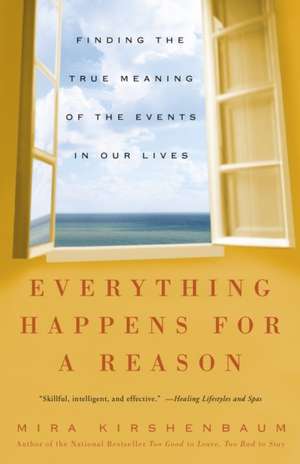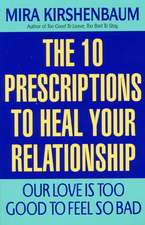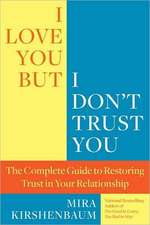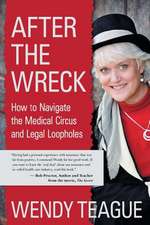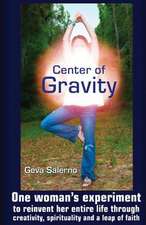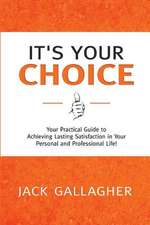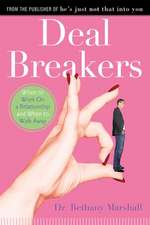Everything Happens for a Reason: Finding the True Meaning of the Events in Our Lives
Autor Mira Kirshenbaumen Limba Engleză Paperback – 31 mar 2005
Preț: 101.39 lei
Nou
Puncte Express: 152
Preț estimativ în valută:
19.40€ • 20.75$ • 16.18£
19.40€ • 20.75$ • 16.18£
Carte disponibilă
Livrare economică 27 martie-10 aprilie
Preluare comenzi: 021 569.72.76
Specificații
ISBN-13: 9781400083213
ISBN-10: 1400083214
Pagini: 234
Dimensiuni: 133 x 207 x 15 mm
Greutate: 0.23 kg
Editura: Three Rivers Press (CA)
ISBN-10: 1400083214
Pagini: 234
Dimensiuni: 133 x 207 x 15 mm
Greutate: 0.23 kg
Editura: Three Rivers Press (CA)
Notă biografică
Mira Kirshenbaum is a psychotherapist and researcher and the clinical director of the Chestnut Hill Institute in Boston, where she has practiced for twenty-five years. She is the author of six previous books, including the influential Too Good to Leave, Too Bad to Stay and Parent/Teen Breakthrough.
Extras
Is it really true that everything happens for a reason? After all, that's an amazing thing to say—that no matter what happens to you, not only does something valuable come out of it but it's just what you need.
Amazing as it sounds, it is true. It's taken me a long time, but I now see that even in the worst disaster—and I've had my share—there are wonderful gifts, hidden opportunities, or life-enhancing lessons. And we couldn't have gotten them any other way. If someone as hardheaded as I am can come to understand this, anyone can.
Of course, sometimes it's easy for us to believe that everything happens for a reason. We see it in little ways, like when our plans for an evening out fall through at the last minute, and we discover that everything we really want is at home that night anyway.
And sometimes we see it in not-so-little ways. A woman I know wrenched her back and had to spend a month in bed. She felt this was the last thing she needed in her life, particularly since it happened at a time when she had to make some important decisions. And then it hit her—this was exactly what she needed. Her old habit had been to rush impetuously into a new decision without thinking it through. Now it was as if life were saying, "If you won't give yourself time to think, I will."
We very much want to believe that the things that happen to us have great meaning. It's the way we feel life should be. Yes, some days we feel our life's a soap opera. But we want—we need—to have the sense that there's a purpose and value to it all. And we're right.
I want to reassure you: When you discover the true meaning of the events in your life, everything changes.
You feel stronger because your sense that everything has meaning gives you great confidence.
You feel wiser because you see how everything connects.
You're more in touch with who you are because you know that you're living the life you were meant to lead.
And you're happier because you're able to put your loss behind you and have a sense of a future filled with good things.
Until you get to this place, nothing is going to feel right. Let's say you're outdoors and you suddenly feel a drop of moisture fall on your head. You're not going to be able to think of anything else until you figure out why that happened. Is water dripping from some air conditioner up high? Is it starting to rain? Is a flying monkey peeing on your head? You have to know why that drop of moisture fell on your head because you can't feel safe going forward until you do.
We need to know why much more when what fell on our heads is a catastrophe. If you can't make sense of the catastrophe, it's as if your life is mere dice on a crap table—if nothing has any meaning, everything's random, anything can happen.
It's painful to live not knowing why you got so sick that time or why you lost the love of your life—much more painful than people suspect. One woman I know was flying home for Thanksgiving when she was in college. As the plane was flying along twenty thousand feet in the air, she developed a terrible earache. But that's not what made her cry. In the dark of a nighttime flight she was sobbing because there was pain like this in the world, seemingly without any rhyme or reason.
One guy described this feeling differently: "When I think about the bad stuff that's happened in my life, I feel I'm just a goddamn fool of the cosmos. It's humiliating! On a sidewalk crowded with people, I'm the one who's stepped in the dog poop. No one else is as stupid or unlucky as I am. The problem is: How can I go forward, how can I trust the future if I feel I am this stupid unlucky guy?"
Knowing that there's a reason for what happens also saves us from being filled with blame. Blame is a very human attempt to make sense of some catastrophe, but most of the time we hate the way it feels. And yet when something bad happens to us, it's almost a reflex to think, It's because everyone hates me, because I'm a loser, because I'm doomed. And so the blame begins.
We blame other people, and then we end up with the sense that the world is full of bad people. We blame ourselves, and then instead of feeling healthy, strong, and whole we see ourselves as sick, weak, and broken. And we blame life itself. What could be more demoralizing than feeling condemned to having bad things always happen to us and not being able to do anything about it?
Blame is like a boomerang that loops around and bonks us on the noggin. Try this yourself: If you see someone struggling with sadness, anxiety, and negativity, listen to his story. You'll soon see he's living in a world where all he sees are things to blame because he lives without positive meanings for what's happened to him. The only cure is to restore the sense that there is a good reason for everything that happens.
Explain That, Why Don't You?
Years ago, if you'd said to me, "Everything happens for a reason," I'd have said that was a lot of bull. Things happened in my life that were so painful it's no wonder I'd had trouble finding their meaning, and I gave up looking. I now know that was a big mistake.
Lots of things happen to us that challenge our sense that everything happens for a reason. It can be anything. You get seriously ill at the worst possible moment. You think you've found the love of your life but something goes haywire between you and now the two of you are over. You've had one of those really painful childhoods. You screw up and lose a lot of money. Someone you love dies.
Yeah, we think, maybe there's a meaning for some things that happen, but not for this.
And even if we still have a shred of faith left that there is meaning in these events, we don't know how to find it. After all, the events in our lives don't come to us with labels attached telling us what they mean. We can spend years searching in vain. We ask friends, but they haven't gone through what we have. We ask someone who has gone through something similar, but that person is probably struggling to find meaning, too.
At some point we might be tempted to give up the search. That's what happened to me. It took one of my patients to wake me up and give me the hope that we can discover the meaning of the events in our lives. Everything important I've learned about how to do my job I've learned from my patients. Scott* was one of my best "teachers."
The Message in the Bottle
We all have dreams of what we'd like to do with our lives. When Scott first came to see me many years ago he was dreaming about going back to school and becoming a landscape designer. But he was afraid to give up his well-paying job. As you can imagine, addressing underlying issues of anxiety, low self-esteem, and identity played an important role in our work together. Soon, though, our work was all about helping him get what he needed to make his dream come true. He ultimately completed a two-year program at an excellent school and eventually opened his own little landscape-design business. He felt fulfilled.
Several years later Scott came back to work with me. Sadly, he had non-Hodgkin's lymphoma, and he thought he was dying. (Scott's cancer eventually went into remission. He's still okay.) He said he wanted to discover why this terrible disease had happened to him just when his life was starting to work out. "Isn't this really a theological question?" I asked Scott. Truthfully, I didn't want to deal with a question like this. My attitude at that time was that you could never find an answer. And anyway, the most important thing is to make the best use of the time you have remaining. Why ask why?
But Scott, bless him, held onto his need. He was about to teach me an important lesson about how helping people is ultimately about helping them find meaning. After I'd dismissed his question Scott looked at me with tears in his eyes as if I'd betrayed him and said, "You don't understand. I don't want to die feeling like I was just some squirrel that got run over on the highway of life—hey, man, bad luck. I know that I'm not just a victim of a game of chance. I can't believe that I live in a universe where the things that happen to us don't have any meaning. There is some meaning in this, a message in a bottle for me. The message feels just out of reach, but it's very important to me. Help me get that message."
Somehow that got through to me. I remembered how much I, too, had wanted to get that message back when I was a kid. (In a few moments I'll tell you about all the things that had happened to me and my family that left me hungry to find some kind of meaning and how discouraged I got when I didn't think I could find any.) Looking in Scott's eyes, I lost my sense of being pissed off at the universe because the things that happen to us don't come neatly labeled with their true meanings. Scott's need reawakened my own and all the hopes that came with it. I'd thought my need for meaning was dead. I'd acted as if it were dead. But the utter genuineness and validity of Scott's need made me realize that my own need for meaning had never died. Suddenly I felt a whole new connection to Scott, to my younger self, and to a world of people who were hungry to feel that what happens to them has meaning.
There was just one problem: How in the world could I help Scott discover why he'd gotten sick and might die if I couldn't help myself? I found myself terribly moved as I told him that I saw how this situation should have meaning and then confessed that I didn't know how to help him find that meaning. I felt I'd failed him. And I felt terrible about it. But I made a promise to myself that I would learn how to help people find the true meanings of the events in their lives.
Scott called several months later. He obviously wasn't as disappointed in me as I was in myself. I guess we all know how tough this search is. He had a note of triumph in his voice.
"I know why I got sick!" he said. "Look at where I was in my life. I'd made a lot of progress, but I was still frightened of so many things—flying, confrontations, bad news, you name it. Here's the gift getting sick gave me. Every day I'm learning not to be afraid, big-time. Death is the big confrontation. Once you face death, how can you be afraid of, like, someone rejecting you? You know, it's true: Cowards die a thousand deaths, heroes die but once. I'd rather live a short life without fear than the living death of a long life filled with fear.
"And I wouldn't have discovered any of this if I hadn't gotten sick. I don't know how much time I have left to live, but in the time I have left I'm feeling more alive and less afraid than I ever did before."
Everyone who survives something feels they have a new lease on life. But Scott felt he had a new lease on life even when he thought he was dying. Understanding that there was meaning in what was happening to him, discovering what that meaning was, made all the difference for him.
It made all the difference for me, too.
A Voyage of Discovery
That was the beginning of my own voyage of discovery. Wow, I thought, it really changes everything if you can discover the reason why some life event has overtaken you. But I was still skeptical—I was far from convinced that Scott had discovered the real reason why he'd gotten sick or if a real reason could be discovered. But it had meaning for him, and as a therapist, I had to take this seriously. Just imagine, I thought, if I could help other people discover what Scott was lucky enough to discover. . . .
Deep down, of course, I knew how badly I needed this myself.
My Story
I'm sure I've had more than my share of blessings. I've been happily married for a long time. I have two great kids. I have good friends. Over the years it's been my privilege to help hundreds of thousands of people, and I love my work. So maybe you're wondering, "Hey, what does Mira know about what it's like to go through something really bad?" Good question.
I grew up with loss baked in my bones. As a child of Holocaust survivors, I lost the entire world in which I was supposed to grow up. Yeah, my parents survived. But everyone else in my family was killed: my mother's seven brothers and sisters, my father's five, all four of my grandparents.
I also lost the early years of my childhood. I was smuggled across Europe at the bottom of a hay wagon. I almost died of dysentery when I was three months old. I lived in a refugee camp for the first four years of my life. A barracks full of grown-ups recovering from shattered lives doesn't make for a good-time nursery school.
When I was four my life again turned upside down and inside out. I lost my father and my sister—my parents had gotten divorced and my father and my sister disappeared from my life. Then I left the only world I'd known, the refugee camp, to come to America.
When I arrived in New York I was so skinny that one of my distant relatives burst into tears when he saw me. My mother went to work in a clothing factory, and I had to take care of my brother. She eventually remarried, but my stepfather was no bargain. And we were poor—I didn't get a new dress until I was ten, and I bought it for myself with the money I'd earned baby-sitting.
Amazing as it sounds, it is true. It's taken me a long time, but I now see that even in the worst disaster—and I've had my share—there are wonderful gifts, hidden opportunities, or life-enhancing lessons. And we couldn't have gotten them any other way. If someone as hardheaded as I am can come to understand this, anyone can.
Of course, sometimes it's easy for us to believe that everything happens for a reason. We see it in little ways, like when our plans for an evening out fall through at the last minute, and we discover that everything we really want is at home that night anyway.
And sometimes we see it in not-so-little ways. A woman I know wrenched her back and had to spend a month in bed. She felt this was the last thing she needed in her life, particularly since it happened at a time when she had to make some important decisions. And then it hit her—this was exactly what she needed. Her old habit had been to rush impetuously into a new decision without thinking it through. Now it was as if life were saying, "If you won't give yourself time to think, I will."
We very much want to believe that the things that happen to us have great meaning. It's the way we feel life should be. Yes, some days we feel our life's a soap opera. But we want—we need—to have the sense that there's a purpose and value to it all. And we're right.
I want to reassure you: When you discover the true meaning of the events in your life, everything changes.
You feel stronger because your sense that everything has meaning gives you great confidence.
You feel wiser because you see how everything connects.
You're more in touch with who you are because you know that you're living the life you were meant to lead.
And you're happier because you're able to put your loss behind you and have a sense of a future filled with good things.
Until you get to this place, nothing is going to feel right. Let's say you're outdoors and you suddenly feel a drop of moisture fall on your head. You're not going to be able to think of anything else until you figure out why that happened. Is water dripping from some air conditioner up high? Is it starting to rain? Is a flying monkey peeing on your head? You have to know why that drop of moisture fell on your head because you can't feel safe going forward until you do.
We need to know why much more when what fell on our heads is a catastrophe. If you can't make sense of the catastrophe, it's as if your life is mere dice on a crap table—if nothing has any meaning, everything's random, anything can happen.
It's painful to live not knowing why you got so sick that time or why you lost the love of your life—much more painful than people suspect. One woman I know was flying home for Thanksgiving when she was in college. As the plane was flying along twenty thousand feet in the air, she developed a terrible earache. But that's not what made her cry. In the dark of a nighttime flight she was sobbing because there was pain like this in the world, seemingly without any rhyme or reason.
One guy described this feeling differently: "When I think about the bad stuff that's happened in my life, I feel I'm just a goddamn fool of the cosmos. It's humiliating! On a sidewalk crowded with people, I'm the one who's stepped in the dog poop. No one else is as stupid or unlucky as I am. The problem is: How can I go forward, how can I trust the future if I feel I am this stupid unlucky guy?"
Knowing that there's a reason for what happens also saves us from being filled with blame. Blame is a very human attempt to make sense of some catastrophe, but most of the time we hate the way it feels. And yet when something bad happens to us, it's almost a reflex to think, It's because everyone hates me, because I'm a loser, because I'm doomed. And so the blame begins.
We blame other people, and then we end up with the sense that the world is full of bad people. We blame ourselves, and then instead of feeling healthy, strong, and whole we see ourselves as sick, weak, and broken. And we blame life itself. What could be more demoralizing than feeling condemned to having bad things always happen to us and not being able to do anything about it?
Blame is like a boomerang that loops around and bonks us on the noggin. Try this yourself: If you see someone struggling with sadness, anxiety, and negativity, listen to his story. You'll soon see he's living in a world where all he sees are things to blame because he lives without positive meanings for what's happened to him. The only cure is to restore the sense that there is a good reason for everything that happens.
Explain That, Why Don't You?
Years ago, if you'd said to me, "Everything happens for a reason," I'd have said that was a lot of bull. Things happened in my life that were so painful it's no wonder I'd had trouble finding their meaning, and I gave up looking. I now know that was a big mistake.
Lots of things happen to us that challenge our sense that everything happens for a reason. It can be anything. You get seriously ill at the worst possible moment. You think you've found the love of your life but something goes haywire between you and now the two of you are over. You've had one of those really painful childhoods. You screw up and lose a lot of money. Someone you love dies.
Yeah, we think, maybe there's a meaning for some things that happen, but not for this.
And even if we still have a shred of faith left that there is meaning in these events, we don't know how to find it. After all, the events in our lives don't come to us with labels attached telling us what they mean. We can spend years searching in vain. We ask friends, but they haven't gone through what we have. We ask someone who has gone through something similar, but that person is probably struggling to find meaning, too.
At some point we might be tempted to give up the search. That's what happened to me. It took one of my patients to wake me up and give me the hope that we can discover the meaning of the events in our lives. Everything important I've learned about how to do my job I've learned from my patients. Scott* was one of my best "teachers."
The Message in the Bottle
We all have dreams of what we'd like to do with our lives. When Scott first came to see me many years ago he was dreaming about going back to school and becoming a landscape designer. But he was afraid to give up his well-paying job. As you can imagine, addressing underlying issues of anxiety, low self-esteem, and identity played an important role in our work together. Soon, though, our work was all about helping him get what he needed to make his dream come true. He ultimately completed a two-year program at an excellent school and eventually opened his own little landscape-design business. He felt fulfilled.
Several years later Scott came back to work with me. Sadly, he had non-Hodgkin's lymphoma, and he thought he was dying. (Scott's cancer eventually went into remission. He's still okay.) He said he wanted to discover why this terrible disease had happened to him just when his life was starting to work out. "Isn't this really a theological question?" I asked Scott. Truthfully, I didn't want to deal with a question like this. My attitude at that time was that you could never find an answer. And anyway, the most important thing is to make the best use of the time you have remaining. Why ask why?
But Scott, bless him, held onto his need. He was about to teach me an important lesson about how helping people is ultimately about helping them find meaning. After I'd dismissed his question Scott looked at me with tears in his eyes as if I'd betrayed him and said, "You don't understand. I don't want to die feeling like I was just some squirrel that got run over on the highway of life—hey, man, bad luck. I know that I'm not just a victim of a game of chance. I can't believe that I live in a universe where the things that happen to us don't have any meaning. There is some meaning in this, a message in a bottle for me. The message feels just out of reach, but it's very important to me. Help me get that message."
Somehow that got through to me. I remembered how much I, too, had wanted to get that message back when I was a kid. (In a few moments I'll tell you about all the things that had happened to me and my family that left me hungry to find some kind of meaning and how discouraged I got when I didn't think I could find any.) Looking in Scott's eyes, I lost my sense of being pissed off at the universe because the things that happen to us don't come neatly labeled with their true meanings. Scott's need reawakened my own and all the hopes that came with it. I'd thought my need for meaning was dead. I'd acted as if it were dead. But the utter genuineness and validity of Scott's need made me realize that my own need for meaning had never died. Suddenly I felt a whole new connection to Scott, to my younger self, and to a world of people who were hungry to feel that what happens to them has meaning.
There was just one problem: How in the world could I help Scott discover why he'd gotten sick and might die if I couldn't help myself? I found myself terribly moved as I told him that I saw how this situation should have meaning and then confessed that I didn't know how to help him find that meaning. I felt I'd failed him. And I felt terrible about it. But I made a promise to myself that I would learn how to help people find the true meanings of the events in their lives.
Scott called several months later. He obviously wasn't as disappointed in me as I was in myself. I guess we all know how tough this search is. He had a note of triumph in his voice.
"I know why I got sick!" he said. "Look at where I was in my life. I'd made a lot of progress, but I was still frightened of so many things—flying, confrontations, bad news, you name it. Here's the gift getting sick gave me. Every day I'm learning not to be afraid, big-time. Death is the big confrontation. Once you face death, how can you be afraid of, like, someone rejecting you? You know, it's true: Cowards die a thousand deaths, heroes die but once. I'd rather live a short life without fear than the living death of a long life filled with fear.
"And I wouldn't have discovered any of this if I hadn't gotten sick. I don't know how much time I have left to live, but in the time I have left I'm feeling more alive and less afraid than I ever did before."
Everyone who survives something feels they have a new lease on life. But Scott felt he had a new lease on life even when he thought he was dying. Understanding that there was meaning in what was happening to him, discovering what that meaning was, made all the difference for him.
It made all the difference for me, too.
A Voyage of Discovery
That was the beginning of my own voyage of discovery. Wow, I thought, it really changes everything if you can discover the reason why some life event has overtaken you. But I was still skeptical—I was far from convinced that Scott had discovered the real reason why he'd gotten sick or if a real reason could be discovered. But it had meaning for him, and as a therapist, I had to take this seriously. Just imagine, I thought, if I could help other people discover what Scott was lucky enough to discover. . . .
Deep down, of course, I knew how badly I needed this myself.
My Story
I'm sure I've had more than my share of blessings. I've been happily married for a long time. I have two great kids. I have good friends. Over the years it's been my privilege to help hundreds of thousands of people, and I love my work. So maybe you're wondering, "Hey, what does Mira know about what it's like to go through something really bad?" Good question.
I grew up with loss baked in my bones. As a child of Holocaust survivors, I lost the entire world in which I was supposed to grow up. Yeah, my parents survived. But everyone else in my family was killed: my mother's seven brothers and sisters, my father's five, all four of my grandparents.
I also lost the early years of my childhood. I was smuggled across Europe at the bottom of a hay wagon. I almost died of dysentery when I was three months old. I lived in a refugee camp for the first four years of my life. A barracks full of grown-ups recovering from shattered lives doesn't make for a good-time nursery school.
When I was four my life again turned upside down and inside out. I lost my father and my sister—my parents had gotten divorced and my father and my sister disappeared from my life. Then I left the only world I'd known, the refugee camp, to come to America.
When I arrived in New York I was so skinny that one of my distant relatives burst into tears when he saw me. My mother went to work in a clothing factory, and I had to take care of my brother. She eventually remarried, but my stepfather was no bargain. And we were poor—I didn't get a new dress until I was ten, and I bought it for myself with the money I'd earned baby-sitting.
Recenzii
“Mira Kirshenbaum is a wise and seasoned guide, her book a welcome map of the difficult terrain of life.” —Dr. Dorothy Firman, coauthor of Chicken Soup for the Mother and Daughter Soul
“In a loving universe everything does happen for a reason, and in Mira Kirshenbaum’s book we are persuaded that the universe always has our best interests at heart—even in our darkest moments.”—Gavin de Becker, bestselling author of The Gift of Fear
“Brilliant, beautiful, and bound to make a profound difference in all of our lives.” —Debra Waterhouse, M.P.H., R.D.,bestselling author of Outsmarting Female Fatigue
“One of life’s wonderful surprises. Insightful, wise, and warm.” —Mary J. Shomon, bestselling author of Living Well with Hypothyroidism
“In a loving universe everything does happen for a reason, and in Mira Kirshenbaum’s book we are persuaded that the universe always has our best interests at heart—even in our darkest moments.”—Gavin de Becker, bestselling author of The Gift of Fear
“Brilliant, beautiful, and bound to make a profound difference in all of our lives.” —Debra Waterhouse, M.P.H., R.D.,bestselling author of Outsmarting Female Fatigue
“One of life’s wonderful surprises. Insightful, wise, and warm.” —Mary J. Shomon, bestselling author of Living Well with Hypothyroidism
